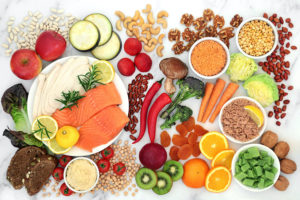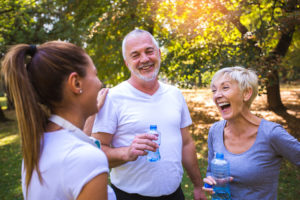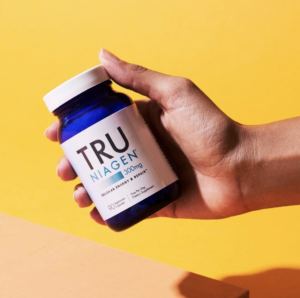This is a “sponsored post.” ChromaDex compensated FOF with an advertising sponsorship to write it. Regardless, we only recommend products or services that we believe will be helpful for our readers. All insights and expressed opinions are our own. —Geri Brin
 A high powered lawyer at a prestigious firm, my 56-year-old friend Wanda doesn’t feel fully awake until she’s had her first cup of coffee in the morning. She also swears she’d never make it through a long night at the office without guzzling at least one giant mugful.
A high powered lawyer at a prestigious firm, my 56-year-old friend Wanda doesn’t feel fully awake until she’s had her first cup of coffee in the morning. She also swears she’d never make it through a long night at the office without guzzling at least one giant mugful.
Coffee might be her quick picker upper, but when Wanda started relying on it throughout the day to give her energy, she realized she wasn’t doing her body any favors. Instead, she felt irritable and anxious, and many nights she couldn’t get to sleep.
Interestingly, of the 80 percent of adults in the United States who consume caffeine, those between 50-and 64-years old consume the most, according to The Food and Drug Administration. Wanda has plenty of company!
An overdose of caffeine – think about those sugar-packed drinks in every supermarket across the country – is no one’s idea of healthy energy. It may get you going in the short term, but have enough of it over the long haul, and it can take its toll on your heartbeat, ability to sleep and nervous system. That’s exactly what Wanda was experiencing.
Sure, it’s convenient to get a quick shot of energy from a can or a mug when you’re exhausted. But, it’s far wiser to support your own natural energy levels by incorporating these 10 common sense practices into your daily lifestyle. That way, your body can store energy to call on when you most need it, let’s say during a late night at work or an afternoon at the playground with your toddler grandson.
![]()
Chronic stress – from a high-pressure job or financial problems, for instance – can cause many types of physical and emotional symptoms, such as tiredness to lack of energy and focus. Determine a way to help reduce your stress, whether it’s seeing a therapist or taking up meditation.
![]()
Taking on too much, professionally or personally, can sap your energy. Surely, not every single thing on your “must-do” list has to get done soon, or ever, for that matter. Streamline the list asap!
![]()
 Relaxing can provide physical and emotional benefits, such as relieving depression and lowering your heart rate. Laziness is another story. Don’t use energy for days or weeks on end and you’ll actually become more and more fatigued, not to mention raise your health risks. Even if you exercise lightly three days a week for 20 minutes each time, you’ll feel more energized after six weeks, according to a University of Georgia study. Regular exercise delivers oxygen and nutrients to your tissues, boosts strength and endurance, and helps your cardiovascular system to run more efficiently. You’ll probably sleep better, too!
Relaxing can provide physical and emotional benefits, such as relieving depression and lowering your heart rate. Laziness is another story. Don’t use energy for days or weeks on end and you’ll actually become more and more fatigued, not to mention raise your health risks. Even if you exercise lightly three days a week for 20 minutes each time, you’ll feel more energized after six weeks, according to a University of Georgia study. Regular exercise delivers oxygen and nutrients to your tissues, boosts strength and endurance, and helps your cardiovascular system to run more efficiently. You’ll probably sleep better, too!
![]()
We guess you really don’t need another reason to stop smoking, but here it is, anyway: Smoking actually saps your energy by making it harder to sleep. The nicotine in tobacco speeds your heart rate, raises your blood pressure, and stimulates brain-wave activity associated with wakefulness. When you stop smoking, you sleep better and energy returns (provided, of course, you’re not mistreating your body in six other ways).
![]()
While it’s ideal to sleep seven to eight hours a night, sleeping soundly for four hours is far better than tossing and turning for eight.  Sleep deprivation has been associated with obesity and related health problems, such as heart disease and diabetes. It can lower your energy level by making you feel fatigued during the day. And, it can impact your immune system, raising your susceptibility to colds and flus and lowering your energy levels for days at a time, according to www.sleepfoundation.org.
Sleep deprivation has been associated with obesity and related health problems, such as heart disease and diabetes. It can lower your energy level by making you feel fatigued during the day. And, it can impact your immune system, raising your susceptibility to colds and flus and lowering your energy levels for days at a time, according to www.sleepfoundation.org.
Quality sleep lets your body restore many functions it needs to stay healthy, such as temperature regulation, a strong immune system, steady hormone levels, and good appetite. All of these processes play a role in your energy level.
![]()

Even if your weight is ideal and you exercise regularly, it’s smarter to consume small meals and snacks every few hours than three big meals every day. This gives your brain a steady supply of nutrients and can lower your perception of fatigue, according to Harvard Health Publishing. Foods with a low glycemic index (their sugars are absorbed slowly) may help you avoid the lag in energy that usually occurs after eating quickly absorbed sugars or refined starches. These foods include whole grains, high-fiber vegetables, nuts, and healthy oils such as olive oil. High-carb foods have the highest glycemic indexes. Proteins and fats have glycemic indexes that are almost zero.
![]()
As we said at the start, caffeine does help increase alertness, but you must drink it judiciously to get its energizing effects.
![]()
No denying that a glass of velvety red wine or a super dry vodka martini can make you chill. But avoid drinking at lunch, when the sedative effect is especially strong. And, if you want or need to have energy in the evening, cut out the 5 pm cocktail. Of course, we don’t have to tell you to drink in moderation, do we?
![]()
 Water is the only nutrient that has been shown to enhance performance for all but the most demanding endurance activities. So, unless you’re training for a triathlon, drink it. Not everyone needs eight glasses of water a day, but everyone absolutely needs it for a trillion reasons, including energy. Feeling fatigued is one of the first signs that you’re dehydrated.
Water is the only nutrient that has been shown to enhance performance for all but the most demanding endurance activities. So, unless you’re training for a triathlon, drink it. Not everyone needs eight glasses of water a day, but everyone absolutely needs it for a trillion reasons, including energy. Feeling fatigued is one of the first signs that you’re dehydrated.
![]()
We know, just the thought of sitting in chemistry class again gives you hives. Don’t worry, you don’t have to do that. But please read these few paragraphs about how our bodies make energy, why our energy production naturally ebbs as we age, and a simple thing we can do to help reverse that process.
Dr. Charles Brenner, a Stanford-educated PhD (you’ve got to be impressed with that credential!), has uncovered the pathway between a molecule called nicotinamide riboside (NR), and nicotinamide adenine dinucleotide (NAD), which he argues is the single most important molecule in every single cell of our bodies.

“We all absolutely need NAD,” Dr. Brenner said emphatically. It performs a number of critical functions, such as enabling our cells to convert the fats, proteins and carbohydrates we eat into the energy we need to help us stay in top shape. It also activates sirtuin genes, which regulate cellular aging and the chemical and biological processes that help us maintain healthy and fit lives, Dr. Brenner reported.
NR is a form of vitamin B3 that helps our cells to produce NAD. Unfortunately, our levels of NAD substantially decline as our bodies slow down with age.
Aging is the biggest risk factor for many of the diseases that kill us. Doing cardio and weight-bearing exercises all week, consuming a diet of nutritious whole foods, getting adequate sleep, and staying away from smoking and drinking are all important. “But cells damaged by the inevitable stresses of life, such as aging, look for ways to replenish their NAD, which helps keep them running smoothly,” Dr. Brenner explained.
An NR supplement actually can reduce the effects of aging on our cells, starting with decreased energy production.
 Dr. Brenner is the Chief Scientific Advisor behind TRU NIAGEN®, the only NR supplement directly from ChromaDex, the worldwide patent-holder and innovator behind it. When you take TRU NIAGEN, you’re getting the real benefits of Dr. Brenner’s important discovery, without the side effects of some other supplements.
Dr. Brenner is the Chief Scientific Advisor behind TRU NIAGEN®, the only NR supplement directly from ChromaDex, the worldwide patent-holder and innovator behind it. When you take TRU NIAGEN, you’re getting the real benefits of Dr. Brenner’s important discovery, without the side effects of some other supplements.
I’ve been taking TRU NIAGEN® for about three years. I feel really good, and while I’ve lost some hair as I’ve aged, I haven’t lost my signature energy. While many claims in the booming nutritional supplement market seem downright absurd, I am living proof that it’s smart to take TRU NIAGEN® since it supports my desire to age the best I can!

